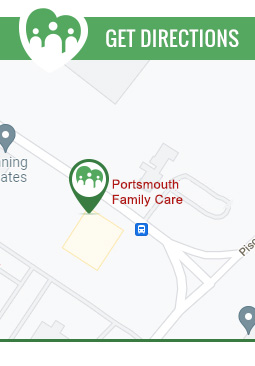What Is a Healthy Weight?
A healthy weight is determined by more than just the number on a scale, it takes into account your age, height, gender, and overall body composition. At Portsmouth Family Care, Board-Certified Dr. Keenan Al-Hojerry, MD help patients understand what a healthy weight means for their individual needs using tools like BMI, waist measurements, and personal health history. Our team focuses on practical, personalized guidance to help you reach and sustain a weight that supports long-term health and well-being. For more information, contact us today or schedule an appointment online. We are conveniently located at 101 Shattuck Way Suite 2 Newington, NH 03801.


Table of Contents:
How much weight do I need to lose?
What should I eat and how much should I eat?
What is a healthy weight?
Do I need to exercise?
Could a weight-loss program help me?
In order to lose weight for the long term, you must commit to the process over a long period of time. Weight loss should not be put off indefinitely, but you should be ready to make permanent changes to your eating and activity habits before you begin.
Aim to lose one to two pounds (0.5 to 1 kilogram) a week over the long term. Through a lower-calorie diet and regular physical activity, you can lose 1 to 2 pounds a week by burning 500 to 1,000 calories more than you consume.
It is possible to achieve your initial weight loss goal by losing 5% of your current weight, depending on your weight. You can reduce your risk of chronic health problems, such as type 2 diabetes and heart disease, by losing even this amount of weight.
Consider both process and outcome goals when setting goals. An example of a process goal would be to walk for 30 minutes every day. Losing 10 pounds is an example of an outcome goal. In order to lose weight, you should set process goals instead of outcome goals.
Depending on your sex, height, weight, and activity level, you need different amounts of calories each day. Dietary balance is important when considering calories. Proteins, carbohydrates, fats, and fruits and vegetables should make up the majority of your calories. A diet that is unbalanced can be unhealthy even if you are getting the right number of total calories.
Having a healthy weight means reducing the risk of weight-related diseases and health problems. In spite of the fact that healthy weight guidelines have been developed at the national level, each person’s healthy weight range will vary depending on factors such as age, gender, genetics, body frame, existing medical history, lifestyle habits, and weight as a young adult. A person’s weight is only one of many factors that determine their health. An indicator of health risk is the body mass index (BMI), which measures weight standardized for height. Research has shown that BMI correlates closely with other methods that measure body fat directly, even though it does not directly measure it.
The general rule of thumb is to engage in moderate physical activity for at least 30 minutes per day. You may need to exercise more if you want to lose weight, maintain weight loss, or reach specific fitness goals.
It is also important to reduce the amount of time spent sitting. You are more likely to develop metabolic problems if you spend more time sitting each day. You can negatively impact your health and longevity by sitting too much, even if you exercise regularly. Researchers have found that sitting less during the day may help people who’ve lost weight keep it off.
A doctor-assisted weight loss program is designed to help obese patients lose weight and adopt a healthier lifestyle. Using these programs, you won’t have to do exhausting exercises or crash diets in order to lose weight. Diets should be improved, physical activity should be maintained, and underlying problems should be addressed instead of focusing on weight loss. Some cases may require the use of medications.
If diet and exercise have not been effective in losing weight, the program may be considered for the patient. The program can also be beneficial for patients with genetic or medical conditions that can make weight management challenging. People with chronic conditions like diabetes can benefit from a medical weight loss program because it can teach them how to live a healthier lifestyle and make healthier food choices.
For more information, contact us today or schedule an appointment online. We are conveniently located at 101 Shattuck Way Suite 2 Newington, NH 03801. We serve patients from Portsmouth NH, Newington NH, Durham NH, Madbury NH, Dover NH, Greenland NH, Stratham NH and surrounding areas.

Additional Services You May Need
▸ Diabetes Management
▸ Family Medicine Physician
▸ Primary Care
▸ Sexual Medicine Doctor
▸ Weight Management
▸ After Hours Care
▸ Women’s Health Exam
▸ School/Sports Physical
▸ Executive Physical
▸ Annual Physical
▸ Adolescent Medicine

Additional Services You May Need
▸ Diabetes Management
▸ Family Medicine Physician
▸ Primary Care
▸ Sexual Medicine Doctor
▸ Weight Management
▸ After Hours Care
▸ Women’s Health Exam
▸ School/Sports Physical
▸ Executive Physical
▸ Annual Physical
▸ Adolescent Medicine





